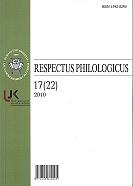TAUTIŠKUMO METMENYS HOMI K. BHABHA’OS TEORIJOJE
DEFINITIONS OF NATIONALITY IN THE THEORY OF HOMI K. BHABHA
Author(s): Inga BartkuvienėSubject(s): Language and Literature Studies
Published by: Vilniaus Universiteto Leidykla
Keywords: tautiškumas; tekstualumas; mimikry; hibridiškumas; metafore; metonymia; dissemination; supplement; difference; postcolonialism; decosntruction
Summary/Abstract: The subject of this paper is focused on the reflection of nation and nationality concepts in the postco¬lonial theory of Homi K. Bhabha. This paper dis¬cusses the concept of the nation as text, the aspects of congruence of “life” and “writing”, the national identification and representation as literature. The paper analyses the problems of defining nation and nationality in the contemporary humanities discourse. The research is carried out in accordance with the findings presented in Homi K. Bhabha article “DissemiNation: time, narrative, and the margins of the modern nation”. The paper explores the mechanisms of reception of nationality and the disturbances in the cultural pluralism. Giving the status of narration for the nation, the researcher is able to analyze the nationality in the similar way the literary works are analyzed. This way, the op¬portunity to observe and cognize the shift of the history of linguistic ideas arises. The same way, the researcher gets a new possibility to focus on the issues (categories) of subject, intersubjectivity, space, time, language and writing by taking into the account the steady and permanent duality of nation narration: the nation tells and the nation is told, the nation says and the nation is said. The investiga¬tion of the problem of subjectivity points out the cases of split and duplication of national, cultural and linguistic identity: mimicry and hybridity. The particular focus was directed towards the replace¬ment of space limits with mental steps and towards the effects of different time structures (historical and cyclical time) on the consciousness of marginal national subjects. The turn from language to writing enables the discussion how national identity un¬folds and reveals itself as contingent and discursive. The analysis of Bhabha’s theoretical assumptions suggested that nation exists as an endless process of signification and as a subject of thought. The meanings of nation shift and change under the influ¬ence of deconstruction strategies of writing: “dis¬semination”, “supplement” and “différance“. The stability of knowledge about nation is consequently impossible. The analysis of Bhabha’s theories in context of deconstruction and poststructuralism displays the interrelationship between postcolonial and other postmodern theories.
Journal: Respectus Philologicus
- Issue Year: 2010
- Issue No: 17 (22)
- Page Range: 79-93
- Page Count: 15
- Language: Lithuanian

